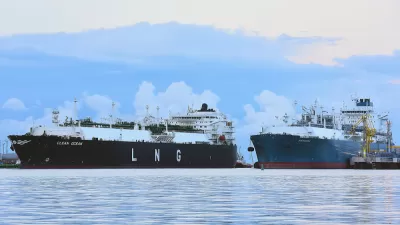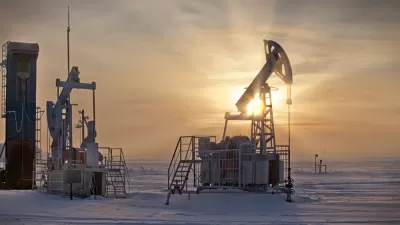At the NATO Summit in Brussels last Wednesday, President Trump charged that Germany was captive to Russia because of its dependence on Russian natural gas, and a new, controversial pipeline from Russia to Germany will exacerbate its dependency.
Rick Noack of The Washington Post reported on President Donald Trump's upending the NATO Summit on July 11 in Brussels, particularly with German Chancellor Angela Merkel:
"Germany, as far as I’m concerned, is captive to Russia because it’s getting so much of its energy from Russia,” Trump told NATO Secretary General Jens Stoltenberg, speaking on camera. “We have to talk about the billions and billions of dollars that’s being paid to the country we’re supposed to be protecting you against.”
Putting the issue of "captivity" aside for the moment, as well as the president's rhetoric and manners, Trump exposed a sensitive issue in European energy politics, and indirectly promoting his administration's energy agenda.
Germany is indeed Russia’s biggest export market in Europe for gas, with a dependency that may grow further once Nord Stream 2 is finished. The project would roughly double Russia’s export volume via the Baltic route that goes through the original Nord Stream pipeline. [See map (jpg) of the two Nord Stream natural gas pipelines].
Russia supplies 41 percent of natural gas to Europe, second after the European Union at 42 percent, according to the WaPo graphic [jpg], but that will be changing in the near future as European sources are "expected to gradually disappear. (Britain, Norway and the Netherlands are Western and Northern Europe’s biggest producers, primarily relying on natural gas fields in the North Sea.)"
Among the four other suppliers (shown in the graphic) of natural gas to Europe is the U.S., comprising a paltry 0.08 percent, and that may indeed be one reason explaining Trump's condemnation of the German-Russian pipeline deal. Over a year ago, the Trump administration introduced a new term, "energy dominance," to replace the Nixon-era "energy independence" that had been the goal of every administration since the 1973 Arab OPEC oil embargo.
Even earlier, in November 2016, the "U.S. officially flipped the energy business by exporting more natural gas than it imported,'" observed Planetizen editor James Brasuell. To send natural gas overseas requires that it be liquefied first, a very expensive undertaking.
"Rising liquefied natural gas (LNG) exports are a sign that theTrump administration’s infrastructure policies are paying off," wrote Energy Secretary Rick Perry last March.
For example, America now has two substantial LNG export facilities in operation. Sabine Pass, spanning the border between Texas and Louisiana, and Cove Point in Maryland are currently loading LNG tankers for the international market. Six more are under construction and are nearly ready for commercial operation. Once online, these facilities will enable the export of more than 10 billion cubic feet of LNG per day to our friends and allies around the world.
By contrast, Russia exported at least 247 billion cubic meters of natural gas to Europe in 2016, or almost 24 billion cubic feet daily.
Economic motives aside, the Nord Stream 2 project is indeed controversial from a political and energy security perspective. "Nations such as Poland and Ukraine also fear that Russia may be diversifying its gas routes into Europe to be able to exploit its grid for political reasons," adds Noack.
In a Feb. 8 Reuters article, "Trump 'energy dominance' policy pits Washington against Moscow," Timothy Gardner reports that "U.S. Secretary of State Rex Tillerson said in Warsaw on Jan. 27 that Washington views the [Nord Stream 2] project as a threat to Europe’s energy security."
Germany a captive of Russia?
Merkel's immediate response to Trump's charge was personal. She "cautioned the president that she may be in a better position to judge her country’s dependence," wrote Noack.
“I’ve experienced myself a part of Germany controlled by the Soviet Union, and I’m very happy today that we are united in freedom,” Merkel said.
The timing was eerie as "[t]he third week of July has been designated as 'Captive Nations Week' since 1959," reported Jacqueline Thomsen for The Hill. President Trump issued the proclamation on July 13, which contains no references to exporting LNG or dependency on natural gas imports, but instead elaborates on what the German chancellor stated.
When the citizens of East Germany tore down the Berlin Wall in 1989, it was a defining moment for freedom...The United States stands with the repressed and continues to encourage despotic regimes to turn away from authoritarianism and respect the God-given rights of life and liberty.
On Monday, President Trump heads to Helsinki to attend on a one-on-one summit with the authoritarian leader of Russia, Vladimir Putin.
FULL STORY: The Russian pipeline to Germany that Trump is so mad about, explained

Maui's Vacation Rental Debate Turns Ugly
Verbal attacks, misinformation campaigns and fistfights plague a high-stakes debate to convert thousands of vacation rentals into long-term housing.

Planetizen Federal Action Tracker
A weekly monitor of how Trump’s orders and actions are impacting planners and planning in America.

San Francisco Suspends Traffic Calming Amidst Record Deaths
Citing “a challenging fiscal landscape,” the city will cease the program on the heels of 42 traffic deaths, including 24 pedestrians.

Adaptive Reuse Will Create Housing in a Suburban Texas Strip Mall
A developer is reimagining a strip mall property as a mixed-use complex with housing and retail.

Study: Anti-Homelessness Laws Don’t Work
Research shows that punitive measures that criminalized unhoused people don’t help reduce homelessness.

In U.S., Urban Gondolas Face Uphill Battle
Cities in Latin America and Europe have embraced aerial transitways — AKA gondolas — as sustainable, convenient urban transport, especially in tricky geographies. American cities have yet to catch up.
Urban Design for Planners 1: Software Tools
This six-course series explores essential urban design concepts using open source software and equips planners with the tools they need to participate fully in the urban design process.
Planning for Universal Design
Learn the tools for implementing Universal Design in planning regulations.
Heyer Gruel & Associates PA
JM Goldson LLC
Custer County Colorado
City of Camden Redevelopment Agency
City of Astoria
Transportation Research & Education Center (TREC) at Portland State University
Jefferson Parish Government
Camden Redevelopment Agency
City of Claremont





























